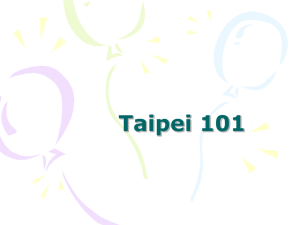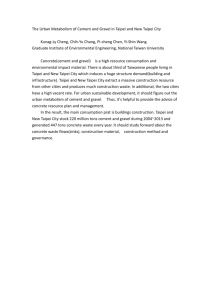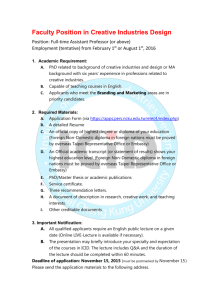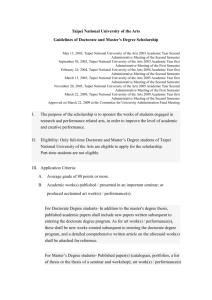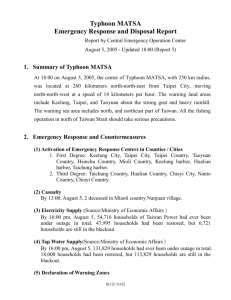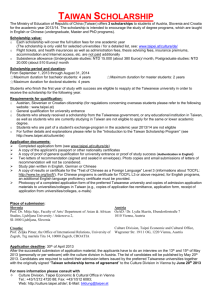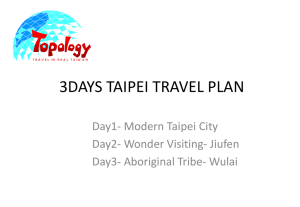TPDEP Introduction
advertisement
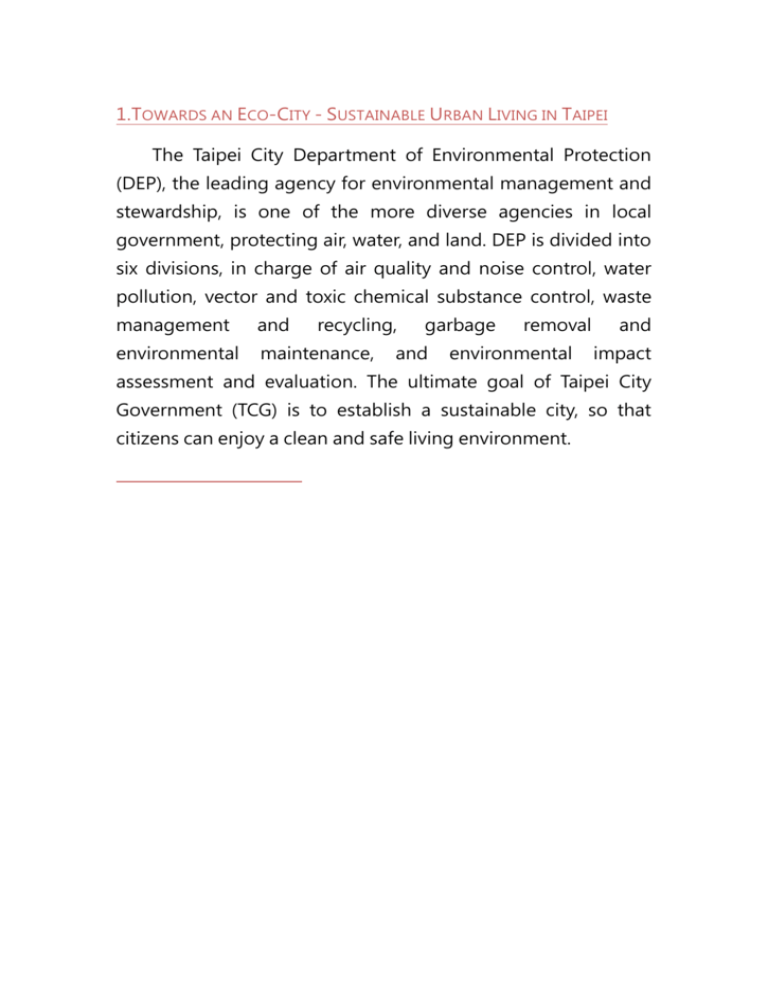
1.TOWARDS AN ECO-CITY - SUSTAINABLE URBAN LIVING IN TAIPEI The Taipei City Department of Environmental Protection (DEP), the leading agency for environmental management and stewardship, is one of the more diverse agencies in local government, protecting air, water, and land. DEP is divided into six divisions, in charge of air quality and noise control, water pollution, vector and toxic chemical substance control, waste management and recycling, environmental maintenance, garbage and removal environmental and impact assessment and evaluation. The ultimate goal of Taipei City Government (TCG) is to establish a sustainable city, so that citizens can enjoy a clean and safe living environment. 2. BRIEF HISTORY OF DEPARTMENT OF ENVIRONMENTAL PROTECTION (DEP) On July 1, 1968, Taipei City was upgraded to the status of a municipality. The Department of Environmental Protection’s basic duties include sanitation maintenance and waste management, namely the treatment of sanitary sewage and removal of trash. The Environmental Sanitation Department was established on Oct. 30th in the same year. It was responsible for air pollution control, water pollution control, and garbage and sewage disposal. Taipei City Government dissolved the Environmental Sanitation Department on July 1, 1982 and set up the current Department of Environmental Protection (DEP). The DEP first worked to step up the control of noise, vectors and toxic chemical substances. 1 3.TAIPEI CITY ENVIRONMENTAL STATUS Population App. 2.69 million people Area App. 271.8 km2 Climate Geography Hydrology Weather Environmental Education Facilities Taipei has a monsoon-influenced humid subtropical climate. Summers are very hot, humid, and accompanied by occasional heavy rainstorms and typhoons, while winters are short, mild and generally very foggy due to the northeasterly winds from the vast Siberian High being intensified by the pooling of this cooler air in the Taipei Basin. Taipei City is situated at the northern tip of Taiwan. Nestled in the center of the Taipei Basin, Taipei's terrain is higher in the northeast and southeast regions, consisting mostly of volcanic mountains and hills that occupy more than half of the city. In Taipei City, the Jingmei, Xindian and Tamsui Rivers snake through the south and west rims; the Keelung River and its tributaries cut through the city, converging with the Tamsui River at Guandu, and empty into the Taiwan Strait. Cumulative Annual Rainfall:app. 2,910mm Annual Rain Days:app. 179 days Mean Annual Temperature:app. 23.2°C Average Annual Relative Humidity:app. 75% Yangmingshan National Park, Guandu Nature Park, Neishuangxi Nature Center, National Taiwan Science Education Center, Taipei Water Park, NTU Experimental Farm, Feitsui Reservoir Environmental Learning Center, Taipei Zoo, Neihu Refuse Incineration Plant, Zhishan Cultural and Ecological Garden 2 4. GLOBAL CLIMATE CHANGE AND REDUCTION OF GREENHOUSE GAS Climate change has become one of the most concerned environmental issues. According to the projections of Intergovernmental Panel on Climate Change (IPCC), by the end of the 21st century, the global average temperature will increase between 1.8-4℃, and the sea level will raise between 18-59cm. In order to reduce greenhouse gas emissions, Taipei City Council passed the “Energy Saving and Carbon Reduction Plan” on April 13th, 2010. DEP, the administration is responsible for (1) reviewing Taipei City’s GHG reduction programs/projects; (2) holding international conferences with a special focus on a low-carbon city or sustainable development; (3) hosting big events to promote public awareness of climate change; (4) Form community-based consultant groups to assist local communities with saving-energy projects. For more information, please visit Taipei Low Carbon City and Greenhouse Gas Reduction Information Website http://www.dep-greengas.taipei.gov.tw/ 3 5. (AIR QUALITY AND POLLUTANT CONTROL) 1. The major sources of air pollution in Taipei City are traffic pollutants and stationary combustion sources. The main pollutants are particulate matter, sulfur dioxide, nitrogen oxide, carbon monoxide, and ozone. In recent years, the air quality of Taipei city has been mostly within the PSI standards. 2. Pollutant Standards Index (PSI) and Health Impact Assessment Index Values AQI Category 0~50 51~100 Good Moderate 4 101~199 200~299 Above 300 Unhealthy Very Unhealthy Hazardous 6.NOISE CONTROL MANAGEMENT Various methods of noise control management are implemented to reach the most effective outcomes: 1. Non-mobilized noise sources control i. To inspect and raise public awareness of factory plants, entertainment and business premises, construction projects, public address facilities, and construction projects or facilities officially announced by Taipei City. ii. To delimit and officially announce new noise control zone classes if needed. 2. Mobilized noise sources control i. To handle complainant conducts on traffic noises ii. To implement the transportation noise improvement or amelioration plan. iii. The provision of assistance for the installation of noise abatement facilities at residences. 5 7. DETECTION OF RADIOACTIVELY CONTAMINATED BUILDINGS In addition to residents’ health concerns, issues surrounding radioactively contaminated buildings include reconstruction, relocation, and compensation. From 1996 January, DEP has been in charge of the initial assessment on radioactively contaminated buildings in Taipei City. In addition, “Taipei City radioactively contaminated buildings autonomy regulations” were promulgated on August 1st, 2005 to protect citizens’ rights and health conditions. 6 8. NEW RIVER, NEW WATERFRONT, NEW CITY 1. Revived Tamsui River With the vision of “New River, New Waterfront, and New City”, Taipei City Government has the goal of making the city one of the most liveable in the world. The Revived Tamsui River Committee was established in 2007 to execute the following strategic action plans: (1) construction of sewage systems and interception stations; (2) improvement plans for Tamsui River landscapes and environment; (3) community renaissance programs for surrounding areas; (4) marketing strategies for recreational activities in Tamsui River; (5) education on cultural heritage and ecological systems alongside the river bank. The ultimate goal is to revive the beautiful city from the past. 7 New River – Preserving and restoring the biodiversity and ecological services of Tamsui River. 1. To establish the prompt pollution reporting system 2. To reinforce pollution source investigation 3. To build the sewer drainage systems 4. To execute intercepting sewer construction 5. To build onsite treatment facilities 6. A more thriving,enterprising and New Waterfront – active city 7. Vibrant, safer and more tolerant Reconnecting the city to neighborhood the river’s edge 8. Bridge construction with Tamsui River Image 9. Restoration of river ecosystem 10.Analysis on ecological surveys of Tamsui River New City – Raising public awareness, enhancing knowledge and empowering civil society to protect our river 8 11. To promote the recreational activities 12. To Organize water sport competitions 13. To advertise the success of integrated management of Taimsui River. 14. To empower the communities and schools to protect the river 15. To develop cultural and ecological educational programs 16. To strengthen the public engagement. 17. 結合社區學校,招募護川志工 18. 河川資產之教育與宣導 19. 鼓勵民眾參與及宣導 2. Soil and Groundwater Pollution Monitoring and Auditing The main work is to establish the database to monitor the quality of soil and groundwater of Taipei City. For the potential polluted sites, extra surveys and management plans will be done to ensure the sustainable use of soil and groundwater, enhance the living environment, and protect public health. 9 3. Drinking Water Management To ensure the quality of drinking water sources, improve public drinking water quality and maintain public health, the sampling inspection on drinking water system has been done by DEP regularly. In addition, public or private premises that provide stationary continuous water supply equipment to the public for drinking are required to perform sampling and testing of water quality conditions to ensure the quality of drinking water shall meet drinking water quality standards. 10 9. DENGNE FEVER PREVENTION Dengue education- Fever Prevention capacity-building depends to ensure on long-term an adequate response to the local situation, and environment cleanupeliminating the mosquitoes’ habitats. Thus, an integrated approach, through advocacy, social mobilization, and chemical interventions is used to ensure that public health bodies and communities are strengthened. Once the government received the dengue fever case, DEP will spray with organophosphate or pyrethroid insecticides in the house and surrounding areas twice a week. 11 10. TOXIC CHEMICAL SUBSTANCE MANAGEMENT There are 302 toxic chemical substances are listed as control items in Taiwan. To prevent these toxic substances to be imported to Taiwan illegally and threaten the public’s health, the government uses top-down approach to manage the flow of these substances. In addition, the government also promulgated the regulation on pest control operators and environmental medication vendors management, and do the regular inspections on environmental agent labels to ensure that the public’s health has been protected. 1. Toxic Chemical Substance Control i. Audition and management on toxic chemical substances flow. ii. Drill and prevention practice on toxic chemical substances disasters. 2. Environmental Agents Permits i. Audition and management on pest control operators and environmental agent vendors. ii. Audition and Management on environmental agent labels. 3. Educational Courses on Environmental Agents Safety 12 11. CRADLE TO CRADLE SOCIETY Taipei City is famous for its effort in garbage recycling, which has become such a good international precedent that other countries have sent teams to study the recycling system. In an effort to attain the goal of "zero landfill, total recycling," DEP aims to foster implementation of integrated solid waste management systems that are cost-effective and protect human health and the environment. Through media campaigns, school fairs, and local activities, DEP assists communities, institutions, and schools to establish more effective recycling programs. According to 2011-2013 statistics, the total amount is approximately 1.7 million tons, with 82,430 tons of recyclable objects collected from public collectors, and about 300,000 tons of kitchen waste (Fertilizing Kitchen Waste, Pig-Feed Kitchen Waste). More achievements are listed as below: i. Establishment of second-hand book center— 7,297 books were exchanged and 48,510 batteries were recycled in 2013. ii. Performance evaluation on recycle projects among local communities in Taipei City. iii. Designated peel bags for pedestrian-used trash bins and recyclable objects sorted program. iv. Public Restroom Management- Since 2001, DEP has co-worked with public and private sectors, take the responsibility to provide and maintain the clean and safe environment for its citizens. 13 12. POLICY ON PER-BAG TRASH COLLECTION FEE Since July 1, 2000, the Taipei City Government has utilized the "Per Bag Trash Collection Fee”. Citizens must use “designated refuse bag” to hold normal waste. Regulated items must be categorized to reduce normal waste; meanwhile, the separated recyclable waste and kitchen waste can be freely given to waste disposal teams to directly help citizens understand the meaning for fees to achieve the goal of reducing waste and increasing recycling. The policy has generally gained public consensus, and resulted in significant increases in the quantities of recycled materials. There are 7 different sizes (3, 5, 14, 25, 33, 76, and 120 liters) of bags that citizens can find from most convenient stores. In particular, the 3 liter and 14 liter bags are re-designed so that citizens can use them as shopping bags. The policy is based on the principle of equality- the more waste accrued the higher the fee, and the less waste will equate to lower fees. In addition, the amount of waste has been reduced significantly since the execution. The household waste reduction rate is up to 66.18%, and the recycling rate is 45.81%. The household average waste collection fee is decreased from NTD $144 to NTD $33.1. 14 13. ADVANCED SOLID WASTE MANAGEMENT (1/3) Muzha Refuse Incineration Plant Muzha Refuse Incineration Plant started operation on March 28, 1995. It is the second largest modern refuse incineration plant in the country. We use high class incineration technology, to effectively control secondary pollution and recycling resources. In particular, SCR technology is used to decompose dioxin to non-toxic gas to meet the environmental requirement. 15 13. ADVANCED SOLID WASTE MANAGEMENT (2/3) Beitou Refuse Incineration Plant In order to achieve reduction, stabilization, sanitation and resource-recycle for waste treatment, and to save landfill space, to control pollutants release, and solve odor problem, the Beitou refuse incineration plant has the latest facilities and technologies. Beitou refuse incineration plant has the recreational center for local residents, the observatory, and the revolving restaurant. The observatory operates in Jan, 2000, and is the first revolving restaurant built in the chimney of the incineration plant in the world. With 120 meters height, the observatory has become one of the most popular spot in Taipei City. Besides, there is about 400,000 people use the recreational center every year since it was opened in 2004. 16 13. ADVANCED SOLID WASTE MANAGEMENT (3/3) Neihu Refuse Incineration Plant Taipei was announced as world design capital 2016. With the theme of “Adaptive Taipei – Design in Motion”, DEP has dedicated itself in creating a cradle to cradle society. Administration of Neihu Refuse Incarnation proposed an experimental project on transforming recycled kitchen waste to bioethanol. By far, the feasibility assessment of the lab was done, and a small scale platform was built in the plant. The lab will collect more data to analyze how to utilize the usage of electricity and heat energy. The results can provide insights for future plant planning. Kitchen Waste Distillation Smashing Pretreatment Hydrolytic Tank Centrifugal Filter Concentrators Fermentation Purfication Absolute alcohol Gelatinized Enzyme Amylase Seed Strain Yeasting Tank In addition, Neihu Refuse Incineration Plant was certificate of Environmental Education Facility in September 2013. It is the first public-operated plant wins the honor. The administration designs 2 environmental courses, “the story of waste management”, as well as “Neihu Refuse Incineration Plant- Insight story of brown land restoration”, and people can learn the plant facilities via the courses. In addition, the administration also plans two 17 excursions, bioethanol experimental lab, reuse of cement-stabilized municipal incinerator fly ash in concrete block experimental field and environmental paths. By doing so, students have more insight understandings on the practice of waste recycling and reuse, and the blueprint of cradle to cradle Taipei City. 18 14. ENVIRONMENTAL RESTORATION PARK 1. The area of Sanzhuku Sanitary Landfill Site is 30 ha, 9 ha is used for storing big recycle objects and disaster wastes. The other 21 ha was restored and became a Eco Park, The park was opened to the public on October 27th, 2013. 2. After restoration engineering project, Fudekun Sanitary Landfill Site was successfully transformed to Crawford Hang environmental restoration Park, which is 37 ha. It has grass skiing field, cycle path, remote control aircraft ground, etc., providing great recreational space for its citizens. 19 15. CONVENIENT AND FLEXIBLE GARBAGE COLLECTION SERVICES 1. Policy on Per-Bag Trash Collection Fee DEP executed the“3-in-1 Keep Trash Off the Ground" program in 1997. Before implementation, several community meetings were held to decide the transport routes and timetable. The “Per-Bag Trash Collection Fee” policy was introduced in 2000. By establishing the convenient garbage removal mechanism, DEP offers large scale garbage collection services and 3-in-1 collection points for garbage, kitchen waste and recyclable objects. After the implementation, the amount of garbage has been reduced significantly-from 1 million tons in 1999 decreased to 360,000 tons in 2013. 2. Collection and Transportation Service DEP establishes 50 time-limited points to collect general wastes and recyclable objects (includes kitchen wastes). The sites are opened from 6am to 11pm, 7 days per week. For more information, please visit: http://www.dep.taipei.gov.tw/MP_110001.html. 3. Large Garbage Collection and National Cleaning Week Citizens can make a phone call to their local cleaning squad and arrange specific time at assigned location for large garbage collection. 20 16.CLEAN URBAN ENVIRONMENT 1. To remove sediment, debris, and other pollutants and maintain clean urban environment, DEP’s street sweeping program requires all the main roads need to be cleaned twice a day; and for busy roads, the work needs to be done before dawn. The cleaning squad use manpower to clean sidewalks and alleys, street sweepers and sewer flushing vehicles are used to clean streets (above 4 meters), highways, and roads around landfills and incineration plants. 2. DEP is responsible for cleaning roads (above 4 meters) and alleys’ lateral canals, connecting pipes, box culverts, culvert pipes, and open drains in Taipei. 3. There are more than 3,000 pedestrian-used rubbish bins in Taipei City. Cleaning squad will maintain and clean those bins regularly. 4. DEP is responsible for illegal posted ads cleaning and reporting. For ads with phone numbers, DEP requests the telecom company to have phone disconnected. 21 17. REGENERATION FURNITURE EXHIBITION AREA Taipei City executed the regeneration furniture project in 2002. With the skills of master workers, the old furniture and bicycles are transformed into sophisticated finished products to serve as auction items to raise money so as to achieve the maximum effect of resource recycling. The annual income from this project has increased from NTD $3 million in 2004 to more than NTD $10 million in 2013. Currently, there are 3 regeneration furniture exhibition areas in Taipei. 22 18. PROMPT AND COURTEOUS SERVICE Taipei City Government set up an online report system to make prompt and courteous services. For anyone who wants to make complaints or other requests, he or she only needs to dial 1999 and the command center will contact the responsible department to solve the issue. DEP is in charge of complaint requests on noise and other pollutants. After receiving the requests from the command center, the health inspection team (HIT) will be on the scene to process the requests; meanwhile, HIT will report the command center the situation so that the procedure will be given a number and keyed in into the system, so that the public can be informed the current process. 23 Reported Items Processing Time The HIT will be on the Noise pollution scene and in process the Public/Private complaint Space requests within 3 hours. Other Pollutants (Air, Smell, Water, Waste, Toxic Substances, Soil, Public Restroom, etc) The responsible units will be on scene and process the complaints within 4 hours. SOP After receiving complaint requests, the command center will contact HIT to the site. HIT will explain the purpose to the site manager and conduct the noise measurement based on the Noise Control Act. If the result shows the noise exceed the noise control standard value, the responsible person should be reported and be notified to make improvement with a specific period of time. After receiving complaint requests, the command center will contact HIT to the site. HIT will explain the purpose to the site manager and conduct the measurement based on the relevant regulations. If the result shows the pollutants exceed the standard value, the responsible person should be reported and be notified to make improvement with a specific period of time. Responsible Unit Health inspection team (HIT) Health inspection team and local cleaning squad From 2011 to Jan 15th, 2014, DEP has processed 89,662 of noise complaints, as well as 53,002 of other complaints from 1999 online report mechanism. 24 19. ENVIRONMENTAL IMPACT ASSESSMENT (EIA) The Environmental Impact Assessment Act promulgated in 1994 in order to prevent and mitigate the adverse impact of development activities to the environment. DEP is responsible for reviewing all the development activities’ EIA in Taipei City. 1. Development activities interpretation: If people concern EIA preparation of any development activity in Taipei, DEP should respond by interpreting the laws, and to consult central competent authority if necessary. 2. Substantial Examination: Assessment Review Environmental Committee is Impact composed of experienced experts and scholars with professional knowledge on EIA. 3. On-Site Monitoring and Auditing: During implementation of the development activity and when using the development development activity, the after completion of the implementation of the environmental impact statement, environmental impact assessment report and review conclusion will be tracked and supervised by the DEP. 25 26 20. EMPOWER THE PUBLIC, CAPACITY BUILDING ON ENVIRONMENTAL EDUCATION The Environmental Education Act was passed in May 2010, and promulgated on June 5th. Taiwan is the 6th country has Environmental Education Act worldwide. With the aim of “Establishment of Low-carbon City, Empowerment on Public Environmental Awareness”, Taipei City published the Environmental Education Action Plan in 2012, with 3 focus areas- regulation, capacity building, and dissemination and implementation. 1. Regulation: to make legislations based on Environmental Education Act and National Environmental Education Framework. i. Establishment Directions for Environmental Education Fund Management Committee of Taipei City Government ii. Establishment Directions for Environmental Education Consultation of Taipei City Government 2. Capacity Building: i. Environmental Education Volunteer Training Education Specialists Training Courses. ii. Environmental Courses iii. Creative Teaching Workshops iv. Teachers’ Green Network Seminars 3. Dissemination and Implementation- popularization on public’s environmental education 27 To advance citizens' understanding of the interdependent relationship between individuals, society and the environment, to raise the different stakeholders’ environmental ethics and responsibility, so as to maintain the ecological balance of the environment and respect lives, and cultivate environmentally aware citizens and environmental studies communities to achieve sustainable development. For more information, please visit Taipei City Environmental Education Website http://www.dep-tee.taipei.gov.tw/ 28
